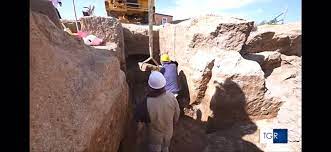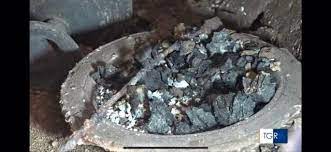2,500-year-old last meal found inside intact tomb in Italy

Rome: A 2,500-year-old Etruscan tomb was recently excavated in Italy, according to local media reports. It contained a rare last meal. Screengrab from TGR A 2,500-year-old tomb was recently unearthed in Italy with a rare last meal still inside, according to local media reports.
The tomb, which was discovered about 70 miles northwest of Rome, was built by the Etruscans, a mysterious civilization that inhabited the Italian peninsula before the Romans, according to an April 4 news release from the Parco di Vulci, an archaeological park. The necropolis was enclosed by large stone slabs and had been undisturbed since its construction in 6th century B.C., according to GreenMe, an Italian news site. Upon finding the centuries-old burial chamber, archaeologists were at a loss for words, according to GreenMe.

Upon excavating the ancient tomb, archaeologists found pottery and a brazier. Screengrab from TGR It is believed to have belonged to a woman based on the presence of a weaving tool and a piece of pottery, according to the park. Also found inside the tomb were the remains of a last meal, a rare and unusual discovery, according to TGR, an Italian news outlet. Coals and a spit were found inside of a bronze brazier, a cooking pan, TGR reported. The utensils would have been used to make meat skewers. Coals in a brazier and a skewer constituted the remains of the last meal, archaeologists said. Screengrab from TGR The newfound artifacts will be sent to a laboratory to be analyzed, according to the outlet. Get unlimited digital access Try 1 month for $1 CLAIM OFFER Animal remains previously discovered in an Etruscan tomb were considered to be associated with a funerary ritual offering known as “food of the dead,” according to a study published in 2013 in the French journal Anthropozoologica. The Etruscans, a sophisticated people with an enigmatic language and disputed origin, were conquered by the Romans in the third century B.C., according to the Smithsonian Magazine. Their civilization was a major influence on Roman and Greek culture.





